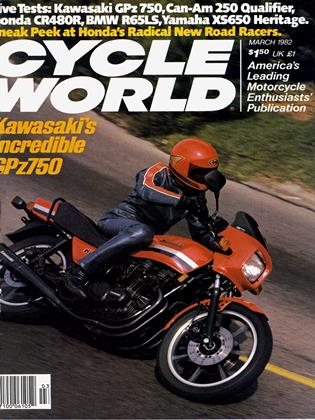American Motocrossers In Europe
Brad Lackey and Mike Guerra Are Working Their Way Toward America’s First Motocross World Championship.
Tom Mueller
It was a bad year, 1981 was, for Brad Lackey, the first American to camIpaign Grand Prix motocross seriously. He started out on his own riding a CZ in 1971, arriving in Europe halfway through the season and marking up a best finish of 11th place.
Lackey skipped World Championship racing in 1972, but in 1973 he was back in Europe on a Kawasaki, and ended the year 13th. In 1974 he signed up to ride a Husqvarna, finishing 10th that year, sixth the next and fifth in 1976. His switch to a Honda works ride moved him up to fourth in the 1977 championship and second in 1978. He jumped to Kawasaki for 1979 and was fourth again, and second in 1980.
But Lackey’ls assault on the title in 1981 ran into serious problems right at the start. He crashed his new factory bike, a Suzuki, in three of the first four motos in the season. “I think I just wasn’t used to the bike yet,” said Lackey after the season’s end. “I just wasn’t ready to go that fast on it.” In the fourth moto he finished third.
But right when things were looking up, Lackey broke his foot, and, with three Grands Prix scheduled right after one another, Lackey rode with the injury, finishing poorly and gradually falling out of condition because he couldn’t train between races.
Lackey’s fortunes rose again at the French GP, which he won, his foot finally healing. He almost won the U.S. Grand Prix at Carlsbad, but crashed while leading the first moto, got up and finished sixth; then took third in the second moto to finish second overall.
But Lackey’s problems weren’t over yet. He got sick after Carlsbad. The undiagnosed illness and lost training time kept him weak for the remainder of the season. In final 1981 points, Lackey finished sixth.
Still, Lackey is optimistic about 1982. “I’ve still got another year on my Suzuki contract for GPs,” he said, “but I’ll have a different schedule than in 1981. In 1982 I’ll be at home more and spend more time racing my Pernod (sponsored) racecar in off road events. And I’ll be more familar with the racebike so it should go better.”
Meanwhile, newcomer Mike Guerra, 23, from Bolton, Connecticut, finished sixth in the 250cc World Championship in his first year of Grand Prix competition, and worked his way into the winner’s circle with third overall finishes in England, West Germany and Holland.
Guerra started the season with a works Husqvarna racebike and didn’t do very well. Then he switched back to his stock Husky and picked up the pace. “Motocross is still 80 percent rider,” explained Guerra, talking about the switch from the unfamiliar works bike back to his triedand-true stocker. “The only way we were going to get ourselves back on track was to go back to square one, and that was the old bike.”
There was more to Guerra’s success than that. He had to learn to cope with the constant travel and unfamiliar European cultures. “The initial shock and the great change threw me off at first,” Guerra said. “But after a little while I met the right people and got into the flow.”
Racing in Europe is a long way from Guerra’s motocross roots in New England Sports Committee racing. It was after successes in NESC events that Guerra and tuner Charlie Benson set out on the American Motorcylist Assn. (AMA) 250cc National circuit. Guerra finished seventh in the AMA championship two years in a row, 1979 and 1980.
From there it was to Europe. Guerra battled difficult tracks as much as he raced other riders; evading jutting rocks and stumps on straightaways, running fifth-gear off-camber straights where jamming his foot down hard on the footpeg closest to the incline was the only hope for traction.
Nothing deterred him. “A long time ago my father taught me to check out the situation,” Guerra said, “and if you decide to go for it, commit yourself totally. There’s no in-between. Either put it on the line or don’t get involved.”
Guerra did not go to Europe with the idea that he could blow away the opposition all at once. But he proved that he is a consistent rider getting very close to the top.
“Every week I try to win,” he said during the season in Europe. “I try as hard as I can and I’m getting better. It’s helped my attitude, my riding and everything else. I want to be the first American World Champion in motocross. I think it will take another one or two years to do it.”
Guerra is in for the long haul, determined but realistic. He isn’t interested in a possible-dead-end in a long-term contract with a motorcycle race team, preferring to examine his options before each season. “I race motocross because I want to,” he said, “and if I’m in it I should be able to take care of myself. I don’t want a threeyear contract with someone to cover myself. If I keep racing I’ll look for a ride each year. Bikes change, other things change.”
Guerra is quick to add, however, that he has signed a contract with Husqvarna for the 1982 season. “I’m satisfied where I am right now,” he said, “and if things improve I’ll be more than satisfied.”














